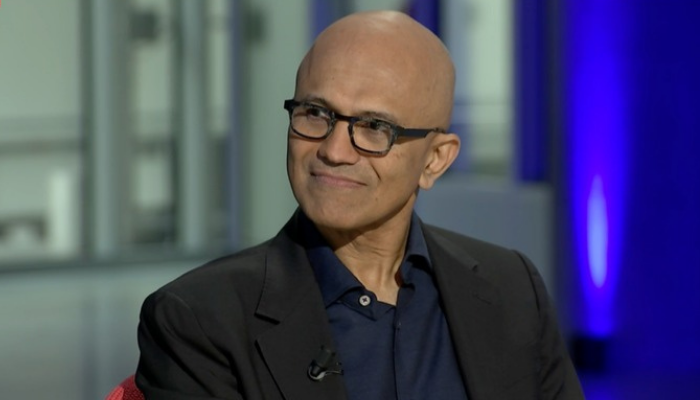Nadella optimistic about AI, NYT lawsuit, cybersecurity
4 min read
During his interview with US journalist Lester Holt, Satya Nadella discussed AI, employment, and AI’s role in elections
Artificial Intelligence is currently a widely debated topic, having witnessed significant changes in just a year due to the emergence of AI chatbots. While discussions about the technology’s benefits have been extensive, its potential and rapid expansion have raised concerns.
Microsoft, a leading participant in the AI competition and a major investor in OpenAI, the developer of ChatGPT, has been at the forefront of the AI race. Recently, Satya Nadella, CEO of the tech giant, engaged in a discussion with Lester Holt, an American journalist and the anchor of NBC Nightly News. Their conversation covered various aspects of AI, including its technologies, challenges, and opportunities, with Nadella addressing topics such as job displacement and regulation.
In addressing the recent hack on Microsoft systems, Nadella stressed the importance of international collaboration, proposing that the US, Russia, and China collaborate to establish a cybersecurity equivalent of the Geneva Conventions.
How extensive are AI advancements poised to be?
Holt opened the conversation by recognizing that 2023 marked a turning point in the recognition of AI’s potential. He noted that while there were discussions about exciting developments like cancer detection and treatment, the year was also dominated by conversations about deepfakes, fraud, and disinformation. He then asked Nadella about the extent of AI’s potential and how far it can be pushed.
The 56-year-old emphasized the importance of discussions not only focusing on the potential of AI but also considering its unintended consequences, which he deemed as a positive development. He stated that the tech industry has learned to address both aspects concurrently. Nadella posed the question, “How can we maximize the benefits while mitigating the unintended consequences?”
Nadella on AI and elections
Later in the conversation, Holt mentioned to Nadella that they were moving toward the first AI-driven election. The host inquired about how AI could assist elections or potentially be used as a weapon. In response, Nadella noted that dealing with disinformation, propaganda campaigns by adversaries, and election interference was not new, even if AI was involved in the process.
“I believe we need to revisit the efforts we’re making in the tech industry, such as watermarking, deepfake detection, and content IDs. As technology advances, we will have more tools to address issues related to disinformation and misinformation. However, the key question remains: how do we establish consensus among parties, candidates, and norms regarding what is acceptable and unacceptable?” Nadella explained to the host.
Does any of it give you pause?
Assuming that Nadella had insight into future developments, Holt asked if any of it gave him pause. In his typical fashion, Nadella emphasized the practical applications of the technology.
“I’m more inclined to view technology as a tool,” Nadella stated. “It shouldn’t replace humans; instead, it should empower them. It’s an assistant, not a replacement.”
Nadella is among the tech leaders advocating for regulation in AI development and deployment, often emphasizing the need for guardrails. When Holt asked him about the specific areas requiring control, Nadella mentioned numerous aspects. “One of the existential risks associated with AI is the possibility that it becomes so powerful that it’s beyond human control. That’s a significant concern for us,” he explained.
AI’s impact on jobs
When questioned about AI’s impact on employment, Nadella expressed confidence in the creation of new jobs but acknowledged the likelihood of overall job displacement in the labor market. “I believe there will be new job opportunities and skills developed, but there will also be a general displacement in the labor market, which I think will be more dynamic than we typically recognize,” Nadella stated.
In January, nearly 100 companies in the US collectively laid off approximately 25,000 employees, citing strategic shifts and restructuring as reasons, with AI being a contributing factor. Concerns about AI replacing jobs and its potential impact on humanity’s future are genuine.
In 2023, Microsoft laid off approximately 12,000 employees, and in January 2024, the company announced the layoffs of 1,900 employees from Activision Blizzard and Xbox. While these actions have been attributed to responses to macroeconomic conditions and evolving customer priorities, the role of AI is a growing concern.
Nadella on NYT’s copyright infringement and cybersecurity
In December of last year, The New York Times filed a lawsuit against OpenAI and Microsoft, alleging copyright infringement. The lawsuit claimed that the two companies had utilized millions of articles from the publication to develop their AI models.
When Holt asked Nadella about the lawsuit and its ultimate beneficiaries, he responded by emphasizing the importance of copyright protection and fair use in a rapidly evolving technological landscape. Nadella stated, “Moving forward, copyright laws will play a critical role in a world where transformative new technologies are emerging. We have faced similar challenges in the past, and I am confident that we will establish the appropriate guidelines for the use of training data.”
Need for Geneva Conventions
On January 12th, Microsoft identified an intrusion into its corporate systems by the prominent threat actor Midnight Blizzard, associated with Russia. During the discussion of this recent hack on Microsoft, both Holt and Nadella recognized the difficulties presented by nation-state adversaries.
The CEO expressed that when the adversary is a nation-state or a country with institutional power, targeting well-resourced organizations relentlessly, he is relieved that Microsoft has the capability to detect such incidents. He even advocated for major powers to establish a Geneva Conventions equivalent for cybersecurity.



